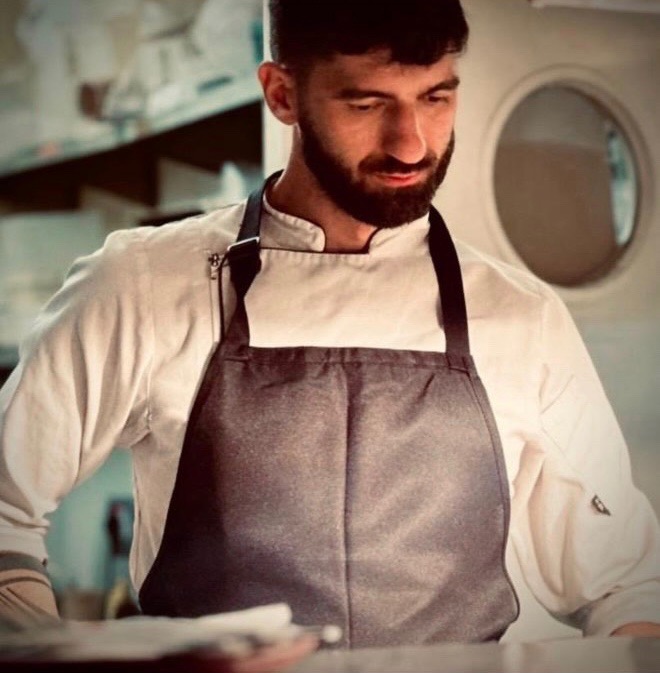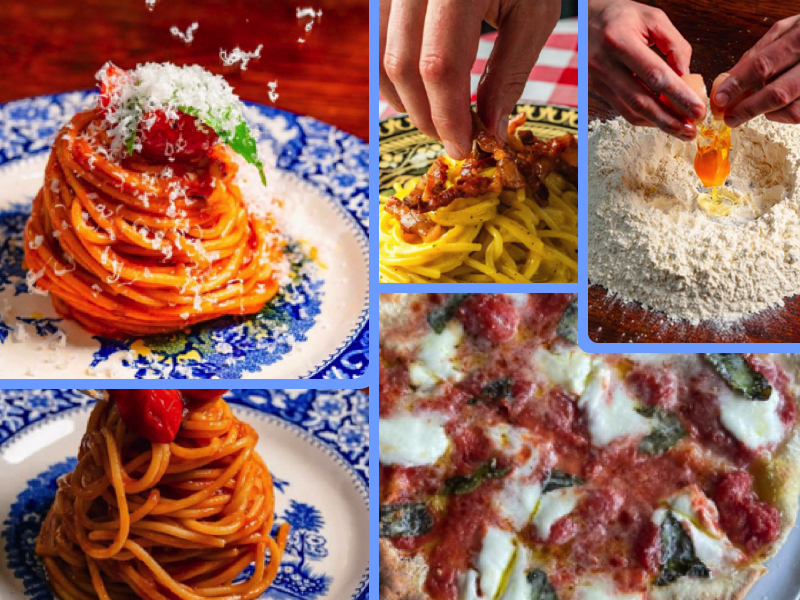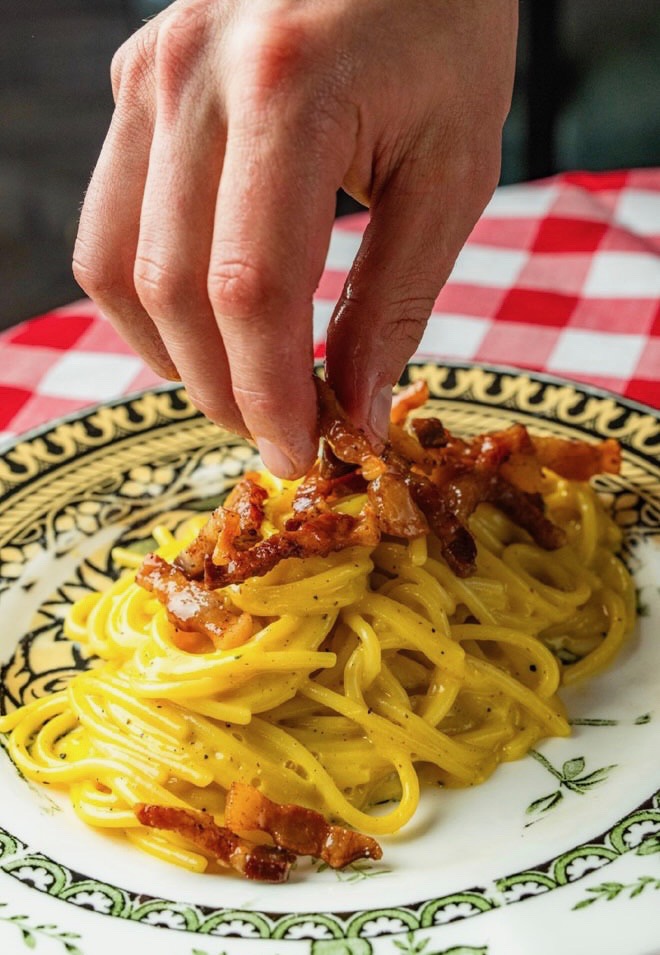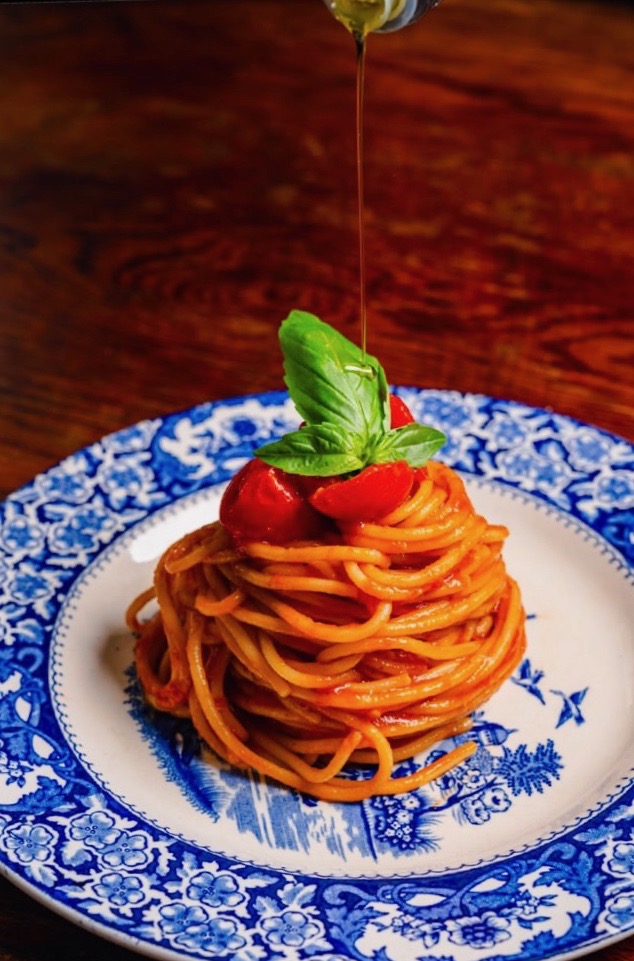In the quiet moment before a dinner party begins, as glasses are polished and sauces stirred, a particular kind of culinary magic happens – one that many London hosts are discovering through the expertise of private chefs. Amongst them is Francesco Alvino, an Italian private chef and Executive Chef Macellaio Rc, whose approach to food blends tradition, precision, empathy – and the occasional helping of nostalgia. Born in Vico Equense, a coastal town nestled along the Sorrentine Peninsula, Alvino brings not only high-level skill to the table but a deep emotional connection to food as a force that binds, heals, and celebrates. His story offers a rare glimpse into the world of a modern private chef in London – and the timeless values that still simmer just beneath the surface of every great meal.

Chef Francesco Alvino at work
Roots & philosophy: Cooking as devotion, not display
Francesco’s culinary roots are embedded in his upbringing in Vico Equense, a picturesque town perched above the Bay of Naples, known for its beaches, views of Mount Vesuvius, and culinary legacy – including pizza a metro, a local favourite stretching by the metre to feed families in style. The region, steeped in hospitality and home-grown flavours, set the stage for his calling.
But the true source of his passion was closer to home. “To truly give your best, you must imagine you are cooking for someone you love,” Francesco reflects. “In my case, I always think of my mamma Laura.”
He credits her for silently passing on the love of food – not through lessons or lectures, but through gestures, the scent of simmering tomato sauce, the care taken in selecting ingredients. “She passed this passion on to me, without even saying it – just through her gestures, the scent of sauce, her attention to detail.”
His words echo a sentiment shared across Italy, where food is often understood as a form of caregiving. Studies by Coldiretti (Italy’s national farmers’ association) reveal that over 70% of Italians say their earliest and most important memories involve family meals – proof that for many, food equals love.

Some of the food prepared by Chef Francesco Alvino
Cultural differences: British order vs Italian emotion
Having cooked extensively in both Italy and the UK, Francesco is uniquely positioned to observe the contrast between British and Italian culinary cultures. “A Neapolitan guest is moved by a well-made tomato pasta,” he explains, “while a Roman dreams of crunchy puntarelle.” Understanding these emotional reactions to regional dishes is essential to his job.
In Italy, every meal tells a story – often one rooted in geography. A family in Bologna may swear by tagliatelle al ragù, while in Sicily, arancini reign supreme. In Britain, by contrast, there’s a stronger national consensus around traditional dishes like roast beef, fish and chips, or sticky toffee pudding.
Mealtime customs reflect this too. British dining rituals often prioritise structure and timing – Sunday roasts served sharply at 1pm, tea breaks at 4, and puddings proudly queued for in buffet lines. Italian meals are more fluid, often lasting hours and shaped by conversation and mood rather than schedules.
“There is beauty in both approaches,” Francesco says, “but a private chef must be able to read the room – and the culture – to deliver something meaningful.”
The role of the Private Chef: Empathy in the kitchen
For Francesco, cooking as a private chef is not only about executing a menu – it’s about understanding the guest on a deeper level. “A private chef has this very specific role: to step into the guest’s life, even just for a day, as if they were part of the family,” he says.
It’s a responsibility he takes seriously. “One of the most gratifying things is seeing people relax the moment you enter their home, knowing you will take care of everything,” he explains. “Recently, this happened with a friend during a private event in his home. For the first time, I saw him truly at ease, happy to have handed over the reins of his ship – his home to me.”
Francesco believes that empathy is a critical ingredient in his work. “When I hear someone say a guest is too demanding, I’m actually glad. It’s a beautiful challenge to find common ground. Empathy is a quality you may be born with, but it must also be trained – like any other skill.”
This belief extends to understanding not just the guest, but the entire chain of production that makes a dish possible. “We are the final link in a chain that connects passion, technique, experience… but also the silent and often difficult work of those who supply us with Italian products.”

Carbonara by Chef Francesco Alvino
Post-Pandemic hosting trends: The rise of dining in (style)
The role of the private chef has evolved dramatically in recent years – particularly since the pandemic. With many people avoiding crowded restaurants, a growing number of Londoners are turning to personalised dining experiences at home.
Hiring a private chef in London no longer feels like a luxury reserved for the ultra-wealthy. Instead, it’s becoming a popular way to host birthdays, anniversaries, or even midweek dinners with friends – without the stress of planning, cooking, or clearing up.
As Francesco notes, “When you consider the average bill for dinner out in London, why not create a unique experience at home instead?” He sees growing interest in interactive experiences, where guests participate in pasta-making or plating – turning dinner into both a meal and a memory.
This shift also reflects a broader appetite for connection. “People want to feel something genuine,” Francesco says. “They don’t just want to eat – they want to be moved.”
Cooking as a way of loving
Francesco’s story reminds us that great cooking isn’t only about taste or presentation. It’s about values – about stepping into someone’s home with humility, care, and respect. “The private chef must be a chameleon: capable of adapting, but also of entering quietly into what is the most important place for anyone – their home.”
Whether he’s preparing pasta al pomodoro for a Neapolitan guest, or crafting a bespoke London tasting menu for a client in Chelsea, the principles remain the same: know your roots, honour your guest, and cook as if you were cooking for someone you love.
As more families across London explore ways to make meaningful memories around the table, chefs like Francesco are helping transform dining into something richer – not just a service, but a shared experience.
Italian food facts London families should know
Perfect for dinner table trivia or impressing the kids!
1. Pasta has over 300 recognised shapes
From farfalle (bow ties) to trofie (twisted spirals from Liguria), Italy boasts hundreds of pasta shapes – each designed to hold specific sauces.
Family Tip: Let kids “match” shapes to sauces – penne for meat ragù, spaghetti for tomato and basil, orecchiette for broccoli!

Spaghetti for tomato and basil by Chef Francesco Alvino
2. Pizza originated as street food
Naples’ famous pizza margherita was created in 1889 to honour Queen Margherita. Its colours? Tomato (red), mozzarella (white), and basil (green) – just like the Italian flag!
Fun Fact: In Vico Equense, where Chef Francesco was born, locals invented pizza a metro – pizza served by the metre – and he grew up going there all the time!
3. Italians don’t drink cappuccino after 11am
In Italy, cappuccino is strictly a morning drink — having it after lunch is a culinary faux pas!
Family Challenge: Try a traditional Italian breakfast — cappuccino (or hot chocolate) with a croissant (cornetto).
4. Olive oil is liquid gold
Italy produces over 450 varieties of olives. Extra virgin olive oil is a kitchen staple — used for cooking, drizzling, and even baking.
Try at home: Dip crusty bread into different olive oils and vote on your family favourite!
5. Italians don’t rush dessert
A proper Italian meal ends with dolci, but fruit often comes before cake. A plate of peaches or oranges with mint may appear before tiramisù.
Idea: Create a two-course dessert night – fruit first, then something sweet!



